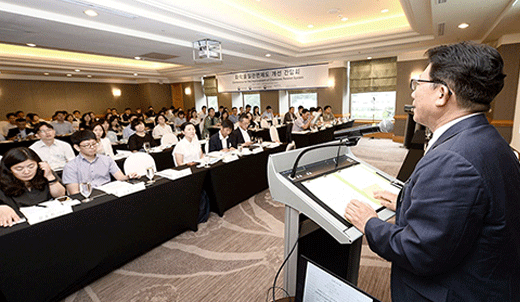
The Office of the Foreign
Investment Ombudsman held a
regulatory infor-
mation meeting
on July 11, 2017. At the meeting,
officials from the Ministry of Environment
(MOE) explained about new laws and
enforcement decrees on chemical substances and chemical products. More than
90 business repre-
sentatives of the foreign
invested companies were present, asking
questions on the impacts of these new regulations on their business. Officials from
the Ministry of Trade, Industry and Energy
(MOTIE) also attended the meeting as
observers.
The MOE officials dealt with three topics: partial revisions on the laws of regis-
tration and evaluation of chemi-
cal substances; the draft enactment of the regulations on the safety manage-
ment of household chemicals and bio-
cides; and the
strengthening the safe management of hazardous chemical substances.
The first topic introduced the back-
ground of strengthening regulations on
toxic chemical substances. Its nece-
ssity
was triggered by chemical acci-
dents that
claimed 100 deaths between 2006 to 2010
due to misuse of humidi-
fier sterilizers. All
new chemical subs-
tances over 1 ton which
are to be used must be registered and their
toxicity has to be evaluated before the
MOE’s final approval is granted.
The second topic was about the eval-
uation of the toxicity of household che-
mical
products. The MOE official expl-
ained the
laws regarding the approval of the use of
biocides to protect the environment and to
reduce chemical accidents. The official
also explained about the approval standard
for use of biocidal substances.
The third topic addressed the legal system of the safe management of chemicals.
The presenter explained the specific measures to strengthen the safety management
recommended by the United Nations. The explanation

covered the issues of safety
supervi-
sion, the administration of the manu-
facturers, storage, operation and trans-
portation of hazardous chemicals and
highly toxic products for children. The
topic also introduced the GHS (Globally
Harmonized System of Classification and
Labeling of Chemicals) and RTDG
(Recommendation on Transport of
Dangerous Goods) managed by ECOSOC
(United Nations Economic and Social
Council).
The MOE’s presentation of the new
laws and revised rules under these three
separate topics was extremely helpful to
the attendees, but at the same time the fact
that the chemical regulations had been
strengthened made the CEOs of the foreign-invested companies feel frustrated to
that extent. Inherently, there is a conflict of
interest between the regulator, MOE and
the foreign CEOs.
This is where the Foreign Investment
Ombudsman comes in. The Ombuds-
man
should play a mediating role in such a way
that the strengthened regulations may not
be excessive. If the regulations are overly
restrictive, we cannot expect the growth of
the chemical industry.
The MOE has been empowered by the
National Assembly to maintain high standards in the protection of the
environment
and human health and they revise chemical regulations
whenever necessities arise.
The MOTIE has been empowered by the National Assembly to keep the nation’s
chemi-
cals industry as competitive as possible. To accomplish this task, the MOTIE
tries to eliminate obsolete or unnecessary
regulations on chemicals. When frictions
arise between the MOE and MOTIE, the
Foreign Investment Ombudsman’s mediating role is needed.
If the officials of the MOE and MOTIE,
the lawmakers and the foreign investors
fully understand their own position and
other positions as well, the gaps and differences among these four groups of stake-
holders would decrease so that they can
come to an appropriate level of agreement.
Chemicals can cause both advantages
and problems. If chemicals are safely
stored and used, they will surely enrich our
lives. But if the chemical substances and
chemical products are mistreated, they can
turn into a deadly weapon. If all stakeholders concerning the production, consumption and the regulation of chemicals fully
under-
stand the issues involved and trust
one another, they will all be winners.